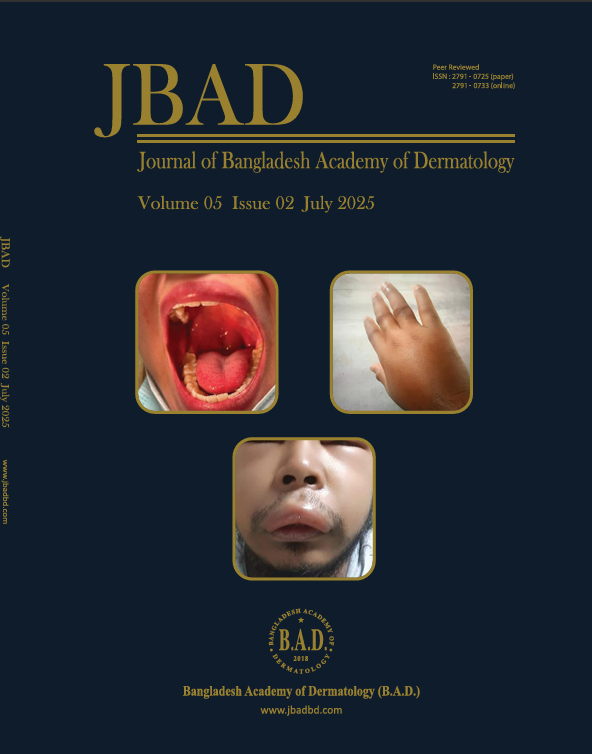Original Article
Bridging the knowledge gap: Public awareness and education strategies for superficial fungal infections prevention in Bangladesh
Author Details
1. Dr. Sazia Afrin, Assistant Professor, Department of Dermatology and Venereology, Bangladesh Medical College and Hospital, Dhaka, Bangladesh.
2. Dr. Md. Tauhidur Rahman, Junior Consultant, 250 Beded General Hospital, Jashore, Bangladesh.
3. Dr. Jaheda Akter, Consultant, Apollo Imperial Hospital, Chattogram, Bangladesh.
4. Dr. Fatamatuz Zohura Antora, Consultant, Medix (United Health Care), Dhaka, Bangladesh.
5. Dr. Sadia Rubana Nila, Registrar, Department of Dermatology and Venereology, Community Based Medical College, Mymensingh, Bangladesh.
6. Dr. Kaniz Fatema, Medical Officer, 250 Beded General Hospital, Jashore, Bangladesh.
Abstract Introduction: Superficial Fungal Infections (SFIs) are among the most common skin conditions in Bangladesh. However, public awareness of their causes, modes of transmission, and appropriate treatments remains limited. The increasing misuse of antifungal and corticosteroid medications has contributed to recurrent infections and reduced treatment efficacy. This study highlights the importance of assessing public knowledge and behaviors to inform prevention strategies and improve treatment outcomes. Objectives: This study aimed to (a) assess public knowledge, atitudes, and practices related to fungal skin infections, (b) identify barriers to effective treatment and sources of misinformation, and (c) propose communication and education strategies to improve prevention and care. Methodology: A cross-sectional survey was conducted among 100 individuals diagnosed with superficial fungal infections using a structured questionnaire. The questionnaire collected information on socio-demographics, disease history, treatment practices, knowledge levels, and sources of health information. Descriptive statistics were used to summarize key findings. Results: Findings indicate critical gaps in public understanding and widespread inappropriate treatment practices. The mean age was 36.4 ± 13.1 years, with 52.5% male participants. Most participants had low-to-moderate income levels (70.7% earning ≤20,000 BDT monthly) and limited formal education (45.5% had primary education or less). Knowledge deficits were severe: 75.8% were unaware of fungal infection causes, 100% did not know about medication resistance, and 99% were unaware that steroid creams can worsen infections. Treatment practices were highly problematic, with 56.4% receiving advice from pharmacists rather than doctors, 70.9% purchasing medicines without prescription, and 27.6% using leftover or shared medicines. Despite treatment, 82.8% expressed dissatisfaction with outcomes, and 79.8% experienced side effects. Major barriers included doctor availability (29.3% of challenges) and lack of knowledge (13.1%). Conclusions: There is a critical need for targeted educational interventions to bridge the knowledge gap on fungal skin disease prevention in Bangladesh. Community-based awareness campaigns, regulation of over-the-counter antifungal products, and improved access to dermatological care are essential to combat misinformation, reduce recurrence, and promote appropriate treatment practices. Keywords: Fungal skin infections, public awareness, health education, treatment resistance, steroid misuse. |
Keywords: Fungal Skin Infections, Public Awareness, Health Education, Treatment Resistance, Steroid Misuse

